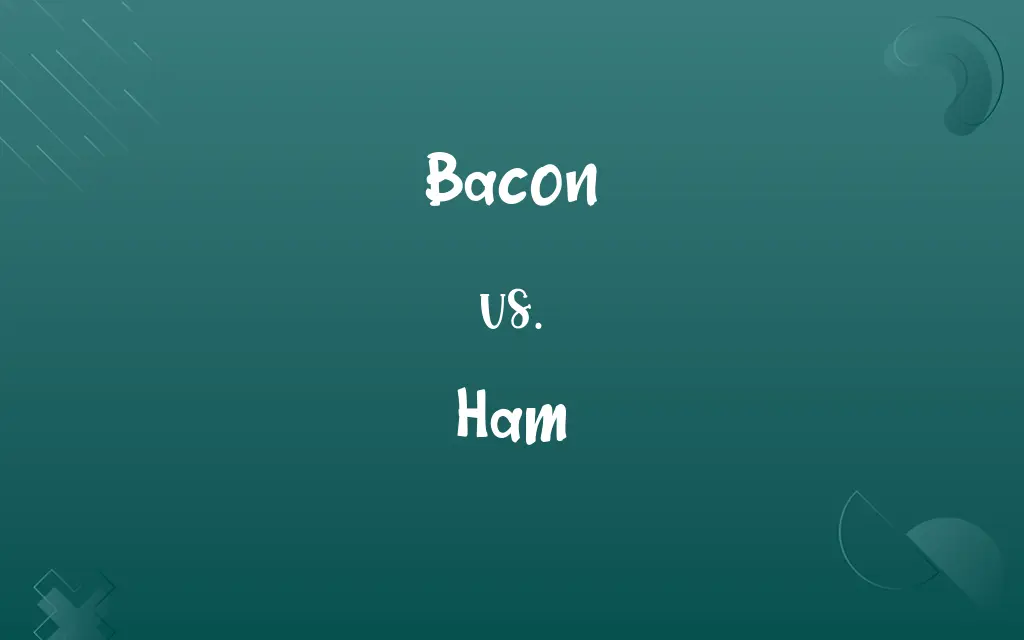Bacon vs. Ham: Know the Difference

By Shumaila Saeed || Updated on December 25, 2023
Bacon is a cured, smoked pork product made from various cuts, primarily the belly, while Ham is a cured or smoked pork cut from the hind leg.

Key Differences
Bacon is made from cuts of pork, primarily the belly, and is known for its rich, fatty content and distinctive smoky flavor. Ham is sourced from the pork's hind leg and is characterized by its leaner texture and a flavor profile that varies from sweet to salty.
Shumaila Saeed
Dec 02, 2023
The curing process for bacon often involves salt and smoking, giving it a robust flavor and crispy texture when cooked. Ham undergoes a curing process too, but it can be dry-cured, wet-cured, or smoked, leading to a wide variety of flavors and textures.
Shumaila Saeed
Dec 02, 2023
Bacon is typically eaten as a breakfast meat or used as a flavor enhancer in various dishes, prized for its fat content and crispiness. Ham is more versatile, served as a main dish, in sandwiches, and as part of larger meals, especially during holidays.
Shumaila Saeed
Dec 02, 2023
The preparation of bacon usually involves frying, resulting in a crispy texture. Ham can be cooked in various ways - baked, grilled, or boiled, and is often served sliced or as part of larger cuts.
Shumaila Saeed
Dec 02, 2023
In terms of nutrition, bacon is higher in fat, which contributes to its calorie content and distinct taste. Ham tends to be leaner, with a lower fat content but can have higher sodium levels depending on the curing process.
Shumaila Saeed
Dec 02, 2023
ADVERTISEMENT
Comparison Chart
Common Uses
Breakfast meat, flavor enhancer
Main dish, sandwiches, holiday meals
Shumaila Saeed
Dec 02, 2023
ADVERTISEMENT
Bacon and Ham Definitions
ADVERTISEMENT
Ham
A cut of meat from the thigh of a hog, often cured by salting or smoking.
Shumaila Saeed
Oct 19, 2023
Bacon
The back and sides of a pig salted and smoked; formerly, the flesh of a pig salted or fresh.
Shumaila Saeed
Oct 19, 2023
Bacon
Roger Bacon. A celebrated English philosopher of the thirteenth century. Born at or near Ilchester, Somersetshire, about 1214: died probably at Oxford in 1294. He is credited with a recognition of the importance of experiment in answering questions about the natural world, recognized the potential importance of gunpowder and explosives generally, and wrote comments about several of the physical sciences that anticipated facts proven by experiment only much later.
The Franciscan monk, Roger Bacon (c. 1214 - 1294) was an important transitional figure in chemistry as he was trained in the alchemical tradition, but introduced many of the modern concepts of experimental science. Bacon believed that experiment was necessary to support theory, but for him the theory as presented in the Bible was true and the experiment only underlined that truth. One of Bacon's lasting contributions was his references to gunpowder, bringing this discovery to the general attention of literate Europeans. Gunpowder had been known for centuries in China, being used for fireworks and incendiary grenades. Gunpowder is a simple mixture of charcoal, sulfur, and potassium nitrate (known generally as saltpeter). Saltpeter is a major component of guano (bird droppings) and may be recovered from privies where it will crystallize. By 1324, Europeans had discovered the art of using gunpowder to fire a projectile, marking the end of the period of castles and knights in armor.
Roger Bacon was Born at or near Ilchester, Somersetshire, about 1214: died probably at Oxford in 1294. He was educated at Oxford and Paris (whence he appears to have returned to England about 1250), and joined the Franciscan order. In 1257 he was sent by his superiors to Paris where he was kept in close confinement for several years. About 1265 he was invited by Pope Clement IV. to write a general treatise on the sciences, in answer to which he composed his chief work, the "Opus Majus." He was in England in 1268. In 1278 his writings were condemned as heretical by a council of his order, in consequence of which he was again placed in confinement. He was at liberty in 1292. Besides the "Opus Majus," his most notable works are "Opus Minus," "Opus Tertium," and "Compendium Philosophiae." See Siebert, "Roger Bacon," 1861; Held, "Roger Bacon's Praktische Philosophie," 1881; and L. Schneider, "Roger Bacon," 1873.
Dr. Whewell says that Roger Bacon's Opus Majus is "the encyclopedia and Novam Organon of the Thirteenth Century, a work equally wonderful with regard to its general scheme and to the special treatises with which the outlines of the plans are filled up.
Shumaila Saeed
Oct 19, 2023
Ham
(anatomy) The region back of the knee joint; the popliteal space; the hock.
Shumaila Saeed
Oct 19, 2023
Bacon
Francis Bacon. A celebrated English philosopher, jurist, and statesman, son of Sir Nicholas Bacon. Born at York House, London, Jan. 22, 1561: died at Highgate, April 9, 1626, created Baron Verulam July 12, 1618, and Viscount St. Albans Jan. 27, 1621: commonly, but incorrectly, called Lord Bacon. He studied at Trinity College, Cambridge, April, 1573, to March, 1575, and at Gray's Inn 1575; became attached to the embassy of Sir Amias Paulet in France in 1576; was admitted to the bar in 1582; entered Parliament in 1584; was knighted in 1603; became solicitor-general in 1607, and attorney-general in 1613; was made a privy councilor in 1616, lord keeper in 1617, and lord chancellor in 1618; and was tried in 1621 for bribery, condemned, fined, and removed from office. A notable incident of his career was his connection with the Earl of Essex, which began in July, 1591, remained an intimate friendship until the fall of Essex (1600-01), and ended in Bacon's active efforts to secure the conviction of the earl for treason. (See Essex.) His great fame rests upon his services as a reformer of the methods of scientific investigation; and though his relation to the progress of knowledge has been exaggerated and misunderstood, his reputation as one of the chief founders of modern inductive science is well grounded. His chief works are the "Advancement of Learning," published in English as "The Two Books of Francis Bacon of the Proficience and Advancement of Learning Divine and Human," in 1605; the "Novum organum sive indicia vera de interpretatione naturae," published in Latin, 1620, as a "second part" of the (incomplete) "Instauratio magna"; the "De dignitate et augmentis scientiarum," published in Latin in 1623; "Historia Ventorum" (1622), "Historia Vitae et Mortis" (1623), "Historia Densi et Rari" (posthumously, 1658), "Sylva Sylvarum" (posthumously, 1627), "New Atlantis," "Essays" (1597, 1612, 1625), "De Sapientia Veterum" (1609), "Apothegms New and Old," "History of Henry VII." (1622). Works edited by Ellis, Spedding, and Heath (7 vols. 1857); Life by Spedding (7 vols. 1861, 2 vols. 1878). See Shakspere.
Shumaila Saeed
Oct 19, 2023
Bacon
Back and sides of a hog salted and dried or smoked; usually sliced thin and fried
Shumaila Saeed
Oct 19, 2023
Ham
(uncountable) Meat from the thigh of a hog cured for food.
A little piece of ham for the cat
Shumaila Saeed
Oct 19, 2023
Bacon
English scientist and Franciscan monk who stressed the importance of experimentation; first showed that air is required for combustion and first used lenses to correct vision (1220-1292)
Shumaila Saeed
Oct 19, 2023
Bacon
English statesman and philosopher; precursor of British empiricism; advocated inductive reasoning (1561-1626)
Shumaila Saeed
Oct 19, 2023
Ham
(acting) An overacting or amateurish performer; an actor with an especially showy or exaggerated style.
Shumaila Saeed
Oct 19, 2023
Ham
The thigh of any animal; especially, the thigh of a hog cured by salting and smoking.
A plentiful lack of wit, together with most weak hams.
Shumaila Saeed
Oct 19, 2023
Ham
A person who performs in a showy or exaggerated style; - used especially of actors. Also used attributively, as, a ham actor.
Shumaila Saeed
Oct 19, 2023
Repeatedly Asked Queries
What part of the pig is bacon from?
Bacon is primarily made from the pork belly.
Shumaila Saeed
Dec 02, 2023
Is ham healthier than bacon?
Generally, ham is leaner than bacon, making it a healthier option in terms of fat content.
Shumaila Saeed
Dec 02, 2023
How is bacon typically cooked?
Bacon is usually fried, but it can also be baked or grilled.
Shumaila Saeed
Dec 02, 2023
Can you use ham as a substitute for bacon in recipes?
Yes, but the dish will have a different flavor and texture.
Shumaila Saeed
Dec 02, 2023
Are there different types of ham?
Yes, including country ham, city ham, and prosciutto.
Shumaila Saeed
Dec 02, 2023
Is bacon always made from pork?
Traditional bacon is from pork, but there are variations like turkey bacon.
Shumaila Saeed
Dec 02, 2023
Is smoked ham different from regular ham?
Yes, smoked ham has a distinct flavor due to the smoking process.
Shumaila Saeed
Dec 02, 2023
Is ham always cured?
Yes, ham is typically cured, either dry or wet, and sometimes smoked.
Shumaila Saeed
Dec 02, 2023
What is the main flavor difference between bacon and ham?
Bacon is smokier and richer, while ham has a more varied flavor profile, from sweet to salty.
Shumaila Saeed
Dec 02, 2023
What's a popular way to eat bacon in the U.S.?
As part of a traditional breakfast, alongside eggs.
Shumaila Saeed
Dec 02, 2023
Is ham commonly used in sandwiches?
Yes, ham is a popular choice for sandwiches.
Shumaila Saeed
Dec 02, 2023
What makes bacon crispy?
The high fat content and the cooking method, usually frying, make bacon crispy.
Shumaila Saeed
Dec 02, 2023
Can ham be eaten raw?
Some hams, like prosciutto, are safe to eat raw due to the curing process.
Shumaila Saeed
Dec 02, 2023
Does cooking method affect bacon's flavor?
Yes, the cooking method can impact the flavor and crispiness.
Shumaila Saeed
Dec 02, 2023
Is country ham the same as city ham?
No, country ham is drier and saltier, while city ham is wet-cured and milder in flavor.
Shumaila Saeed
Dec 02, 2023
What's a healthier alternative to bacon?
Turkey bacon is a lower-fat alternative.
Shumaila Saeed
Dec 02, 2023
Can bacon be used in vegetarian dishes?
Traditional bacon no, but there are vegetarian bacon alternatives.
Shumaila Saeed
Dec 02, 2023
Is all ham sweet?
No, the flavor varies from sweet to savory, depending on the curing process.
Shumaila Saeed
Dec 02, 2023
Can ham be the main dish at meals?
Yes, especially during holidays like Christmas and Easter.
Shumaila Saeed
Dec 02, 2023
Share this page
Link for your blog / website
HTML
Link to share via messenger
About Author
Written by
Shumaila SaeedShumaila Saeed, an expert content creator with 6 years of experience, specializes in distilling complex topics into easily digestible comparisons, shining a light on the nuances that both inform and educate readers with clarity and accuracy.






































































